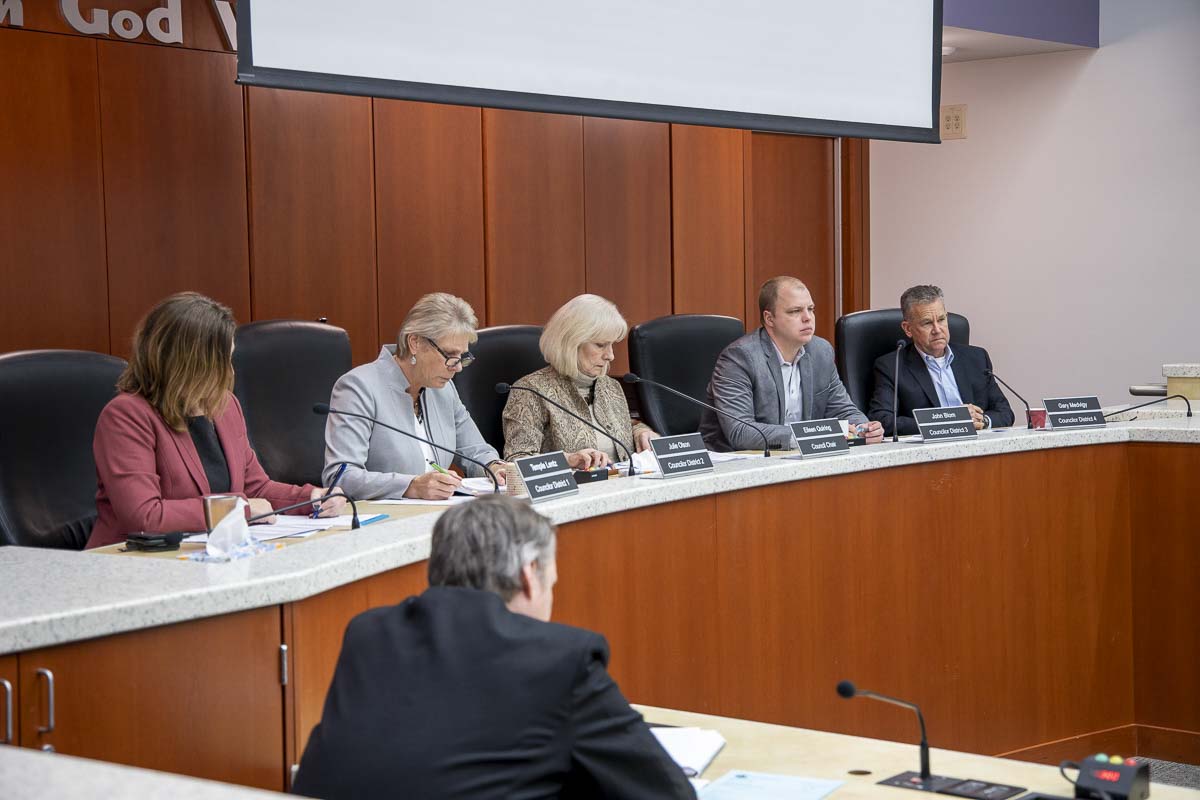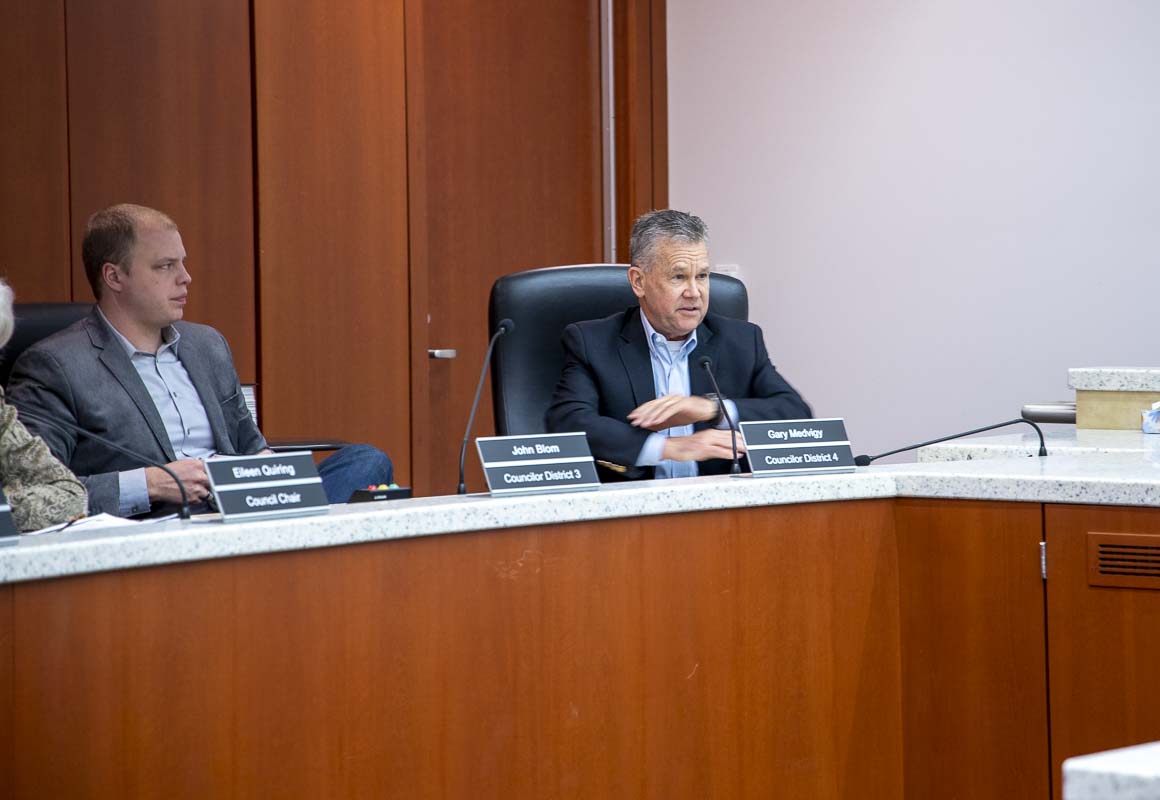The two dissenting votes say the process lacked transparency and public input
CLARK COUNTY — The new year will be upon us soon, but whether old acquaintances will be forgotten on the Clark County Council remains to be seen.
The November approval of the 2020 budget on a 3-2 vote came with a flurry of last-minute amendments, most introduced by councilors John Blom and Julie Olson, both Republicans, who were joined in voting yes by the council’s lone Democrat, Temple Lentz.

Left out in the cold were Council Chair Eileen Quiring, and Gary Medvigy, who was named to fill Quiring’s District 4 seat when she became council chair, and won election in November to finish the remainder of her term. Quiring and Medvigy both said they couldn’t support increasing property and street tax levies by $1.7 million as part of the budget.
“It’s tax fatigue,” said Medvigy before the vote. “Whether it’s the car tabs or these advisory votes, the public is speaking, ‘stop taxing us.’”
However, it was more than the tax increases that concerned Medvigy. He noted shortly after the vote in an interview with Clark County Today that many of the programs that were funded in the 11th hour came with little-to-no council discussion, and no public input.
“We need a procedure to handle these amendments where we actually then have substantive discussion of the merits of it,” said Medvigy “and an opportunity for the public to know about it and the public to provide input.”

Quiring was unavailable to be interviewed as part of this story, but did say she and Councilor Medvigy were on the same page with their concerns.
The whole process, said the former judge, would get a grade of F from him.
“The F is for the lack of process, or poor processes, and the fact that the three of them obviously organized this ahead of time,” Medvigy said of fellow councilors Olson, Blom and Lentz. “They had the numbers, they had the language, and they voted on it on the fly without any public notice, without an opportunity for the public to respond.”
Blom, who introduced amendments to fund a new Superior Court judge, provide a mail scanner in the county jail, and fund a new position in the assessor’s office to deal with senior tax exemptions, said he provided Medvigy copies of his proposed amendments before the meeting.
“So for him to say he did not have an opportunity for input is not accurate,” wrote Blom in an email. “There was opportunity for discussion about all the amendments during the hearing.”
On that last point, Clark County Manager Shawn Henessee says it is up to the council if they want to look at changes to the budget process to require amendments to be announced before a meeting, in order to allow for public input.
“I presented my recommended budget roughly a month before the approval,” said Henessee. “In that intervening time, I tried to meet with all of [the councilors]. I asked all of them to submit their respective amendments. There’s some disagreement about the processes, but that’s really an internal decision for them to make.”
During the budget hearing in the council’s final meeting before Thanksgiving, things clearly were strained by the end of the meeting, with Quiring stating “I would have made an amendment to be able to do the assessor’s budget and taken it from other funds so that would have been balanced.”
“Well you didn’t propose it,” responded Olson with a chuckle.
“Oh, isn’t it funny?” shot back Quiring.
Asked to share her thoughts on the matter, Lentz said only that she felt the “temper tantrums” of the two councilors who were on the losing end of the budget vote were not “newsworthy.”
“They had multiple opportunities to read the material, do the work, and make proposals. Instead they chose not to do the work, not to make proposals, and to whine after the fact,” wrote Lentz. “That’s their prerogative, but not one that I feel needs to be entertained and encouraged.”
Blom also noted that the complaints raised by Medvigy and Quiring came well after the budget process had concluded.
“During both work sessions, neither Quiring nor Medvigy expressed any hesitation or concern about the county manager’s proposed budget,” wrote Blom. “At the hearing, they did not bring forward any amendments that would have made the budget acceptable to them. To me, that in and of itself is a lack of transparency and a disservice to the people of Clark County.”
Olson said she would be willing to comment once she returned to the country after Dec. 14, but then did not respond to a follow-up request for an interview.
Medvigy said there was no council discussion on the public record, prior to the first day of the budget hearings, about most of the amendments that were brought forward. Olson said her amendment to provide $150,000 for derelict RV cleanup efforts came after meeting with Clark County Sheriff Chuck Atkins and several other departments, but admitted the topic had not been discussed in front of the full council ahead of the budget vote.
“We, as a group of five, could put a better process in place right now, if they’re willing,” said Medvigy. “Anytime there’s an amendment like that, it should be heard on a different day. After we’ve taken testimony on it, we’ve had all of our questions answered, and the public has had an opportunity to respond.”
Blom, at least, said he would be open to discussing that process.
“I would agree it would be good if there was a way to open back up public comment on amendments,” he wrote. “I would be open to a discussion about how that could be accomplished.”
It could also be a topic for the Charter Review Commission, a 15-member panel that will be elected in the 2020 general election, and will have broad authority to propose amendments to the 2014 Home Rule Charter, which created the five-member council, with four districts and one at-large chair. Any amendments proposed by the group would then be voted on by the citizens in the Nov. 2021 general election.




